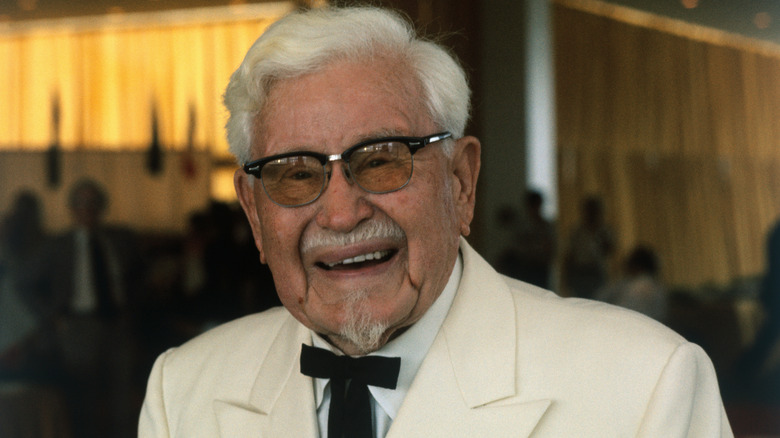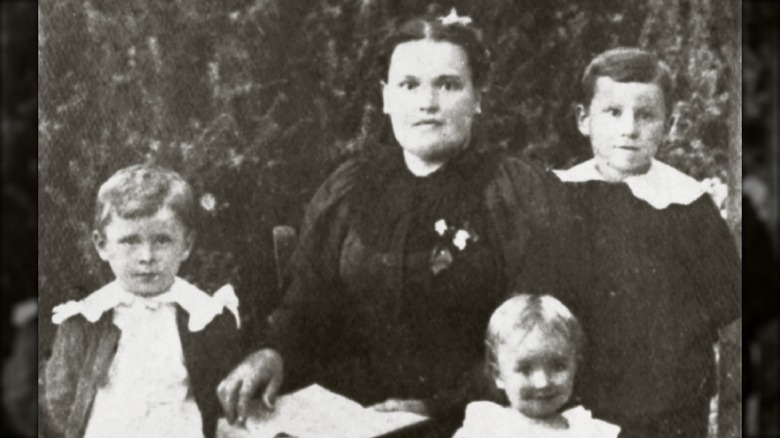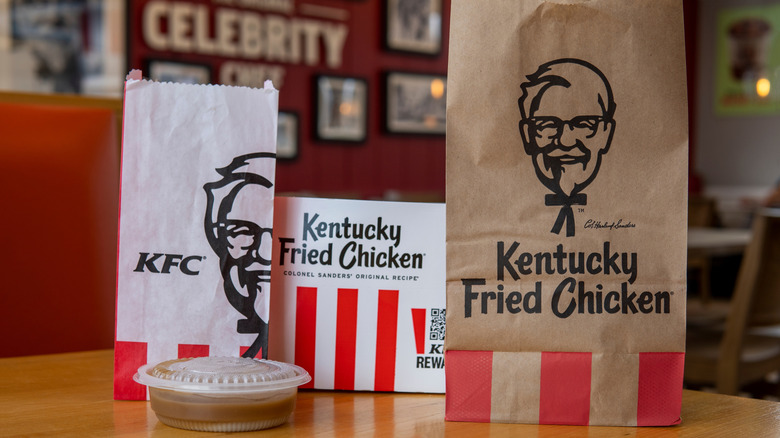How Much Colonel Sanders Was Worth When He Died
With an estimated 31,981 locations spread out all over the world, KFC (aka Kentucky Fried Chicken) isn't just a fast food restaurant, it's a global institution. While there have been lots of big changes at KFC in 2025 (including the debut of new items like its Korean BBQ Mac & Cheese Bowl), the restaurant wouldn't be where it is today without its inimitable founder, Colonel Harland Sanders. Best known for his down-home Southern drawl and folksy demeanor, Colonel Sanders is such an icon that he even assumes the role of pseudo-Santa in Japan's KFC-based Christmas traditions. KFC's founder was a lot more than just a company mascot, however, as the real man was known for his towering personality and dogged dedication to getting fried chicken just right.
This devotion to the art of fried chicken not only made Sanders and KFC household names, it also made the man behind the brand considerably richer. At the time of his death in 1980, at the ripe old age of 90, Sanders was said to have an estimated net worth of $3.5 million, although that's a comparatively low figure when you consider KFC's overall success as a fast food chain. Sanders sold KFC in 1964 in exchange for $2 million plus the ability to advise the new owners and serve as the face of the chain, which came with its own yearly salary. The founder was also offered 10,000 shares of stock, which he declined, indicating his famously idiosyncratic nature. As reported by Biography, Sanders once said, "There's no reason to be the richest man in the cemetery. You can't do any business from there."
Harland Sanders exhibited a talent for cooking at a young age
While Sanders was designated as a Kentucky Colonel by the state's governor in 1935 as a means to honor his commercial contributions, the entrepreneur was actually born in Indiana in 1890. Though typical for the times, Sanders' childhood was a far cry from the experience most Americans are accustomed to today. The entrepreneur was one of three siblings and was forced to take over child-rearing duties at the age of 6 after his father died. Part of these duties involved making meals, which the young Sanders showed an affinity for. Eventually, the entrepreneur dropped out of school and worked a series of jobs throughout adulthood, including farm worker, firefighter, attorney, insurance salesperson, and gas station owner.
It was at Sanders' gas station where he would begin experimenting with his world-famous chicken recipe as a means to offer drivers on long journeys a bit of food. The Colonel's cooking was so successful that he eventually opened a stand-alone restaurant and started making deals with other dining establishment to sell his chicken for a cut of the money. It was this DIY franchising process that saved the Colonel from financial ruin after closing his first restaurant, but it also allowed him to spread word of his chicken — and brand — far and wide.
Was Harland Sanders happy with KFC at the end of his life?
If you think it was all sunshine and roses for the Colonel after he relinquished control of KFC, you'd be wrong. While he came a long way from his extremely humble beginnings in Indiana, Sanders was highly dissatisfied with the restaurant he founded after it passed on to new owners (the chain was sold again in 1971). Sanders even sued the new owner of KFC for more than $1 million over allegations that his new restaurant concept (which was very similar to KFC and was even named Claudia Sanders, The Colonel's Lady Dinner House in honor of his wife) was being blocked from pursuing franchise opportunities.
Even when he retained control over the chain, Sanders frequently expressed concerns about the quality of his chicken in the hands of franchisees. One particular sticking point was the Colonel's gravy recipe, which was as high-quality as they come but was far too labor intensive to be reasonably made at a fast food establishment. Sanders was notorious for his gravy obsession and once criticized the quality at his own restaurant (the Colonel Sanders Kentucky Inn, which was his remaining restaurant after selling KFC), stating that it wasn't suitable for his dogs. Although KFC's legacy might not be exactly what the Colonel intended, Sanders' status as a true American icon remains intact.


